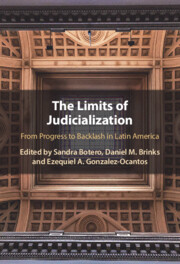Book contents
- The Limits of Judicialization
- The Limits of Judicialization
- Copyright page
- Contents
- Figures
- Tables
- Contributors
- Acknowledgments
- 1 Working in New Political Spaces
- 2 Critical Disconnects
- 3 When Winning in the Courts Is Not Enough
- 4 Forms of Countermovement and Counter-Reform in Latin America
- 5 Backlash against State Strengthening Reforms
- 6 Backlash against Corporate Accountability for Grave Human Rights Violations in Colombia
- 7 Courting Judicial Legitimacy
- 8 Family Ties and Nepotism in the Mexican Federal Judiciary
- 9 Judicial Corruption
- 10 Kickbacks, Crackdown, and Backlash
- 11 Turning Corruption Trials into Political Tools in the Name of Transparency
- 12 Fighting Corruption, Dismantling Democracy
- 13 Prosecutorial Agency, Backlash and Resistance in the Peruvian Chapter of Lava Jato
- Index
- References
13 - Prosecutorial Agency, Backlash and Resistance in the Peruvian Chapter of Lava Jato
Published online by Cambridge University Press: 11 August 2022
- The Limits of Judicialization
- The Limits of Judicialization
- Copyright page
- Contents
- Figures
- Tables
- Contributors
- Acknowledgments
- 1 Working in New Political Spaces
- 2 Critical Disconnects
- 3 When Winning in the Courts Is Not Enough
- 4 Forms of Countermovement and Counter-Reform in Latin America
- 5 Backlash against State Strengthening Reforms
- 6 Backlash against Corporate Accountability for Grave Human Rights Violations in Colombia
- 7 Courting Judicial Legitimacy
- 8 Family Ties and Nepotism in the Mexican Federal Judiciary
- 9 Judicial Corruption
- 10 Kickbacks, Crackdown, and Backlash
- 11 Turning Corruption Trials into Political Tools in the Name of Transparency
- 12 Fighting Corruption, Dismantling Democracy
- 13 Prosecutorial Agency, Backlash and Resistance in the Peruvian Chapter of Lava Jato
- Index
- References
Summary
Peru’s Lava Jato stretched its tentacles widely and ravaged the political establishment. Grand corruption cases present a series of challenges related to how to secure evidence in information-poor and politically hostile environments. Overcoming these challenges without jeopardizing the integrity of the inquiry is no small feat. The tools that prosecutors rely on generate controversy, as well as tensions between effectiveness and due process that are difficult to resolve. Success therefore calls for clever and skillful prosecutors. The analysis digs deep into the dynamics of Peru’s Lava Jato to discuss the nature of these challenges and how prosecutors dealt with them. Contingent choices often determined whether enough evidence came to light, thus widening the window for ambitious investigative efforts. The chapter further looks at the backlash that ensued, how this conditioned prosecutorial efforts, and why investigators were able to mitigate its impact. One interesting feature of Peru’s Lava Jato is that prosecutors not only had to deal with an obstructionist political class, but also with networks of judicial clientelism commanded by senior officials. The chapter traces how rank-and-file prosecutors negotiated such bureaucratic pathologies to protect the inquiry, and discusses the likely impact of these struggles on the future of the case.
- Type
- Chapter
- Information
- The Limits of JudicializationFrom Progress to Backlash in Latin America, pp. 314 - 340Publisher: Cambridge University PressPrint publication year: 2022
References
- 2
- Cited by

